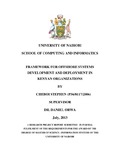| dc.description.abstract | Offshoring refers to the movement of service-sector jobs from developed economies
to offshore locations that are cheaper. Most companies opt to offshore systems
development and deployment with the aim of reaping benefits such as reduced costs,
but fail to consider the risks and challenges associated with such arrangements.
The main objective of this research was to develop a framework for offshore systems
development and deployment in Kenyan organizations. A survey study of companies
in Kenya was taken. The study was conducted through a descriptive survey design.
The target populations were all the decision makers and implementers of offshore
systems development and deployment in companies trading at the Nairobi stock
exchange totaling 60 in number. Samples of 52 firms were used in the research. The
research used primary data that was collected through a self-administered
questionnaire. The research yielded quantitative data from the questionnaires, which
were analyzed using descriptive statistics and factor analysis. Correlation Analysis
was also used to establish the relationship between various factors and organization
performance/value. The data was analyzed and presented using tables, pie chart and
graphs.
Results and conclusions indicated that there are several benefits and risks and
challenges of offshore systems development and deployment. These benefits include
cost savings, quality, human capital (Solution to the IT skills shortage), and simplicity
and remain focused on core competencies. The risks and challenges include
operational problems, loss of competencies, threat of opportunism, detailed
specifications required and unexpected costs/hidden costs. The factors influencing
offshoring include cost, legal, cultural, IS security, human resource and
infrastructural, specialization, and cost reduction and quality factors.
The research recommended that companies entering into offshore systems
development and deployment should consider the benefits and the risks/challenges
associated with such arrangements. | en |

